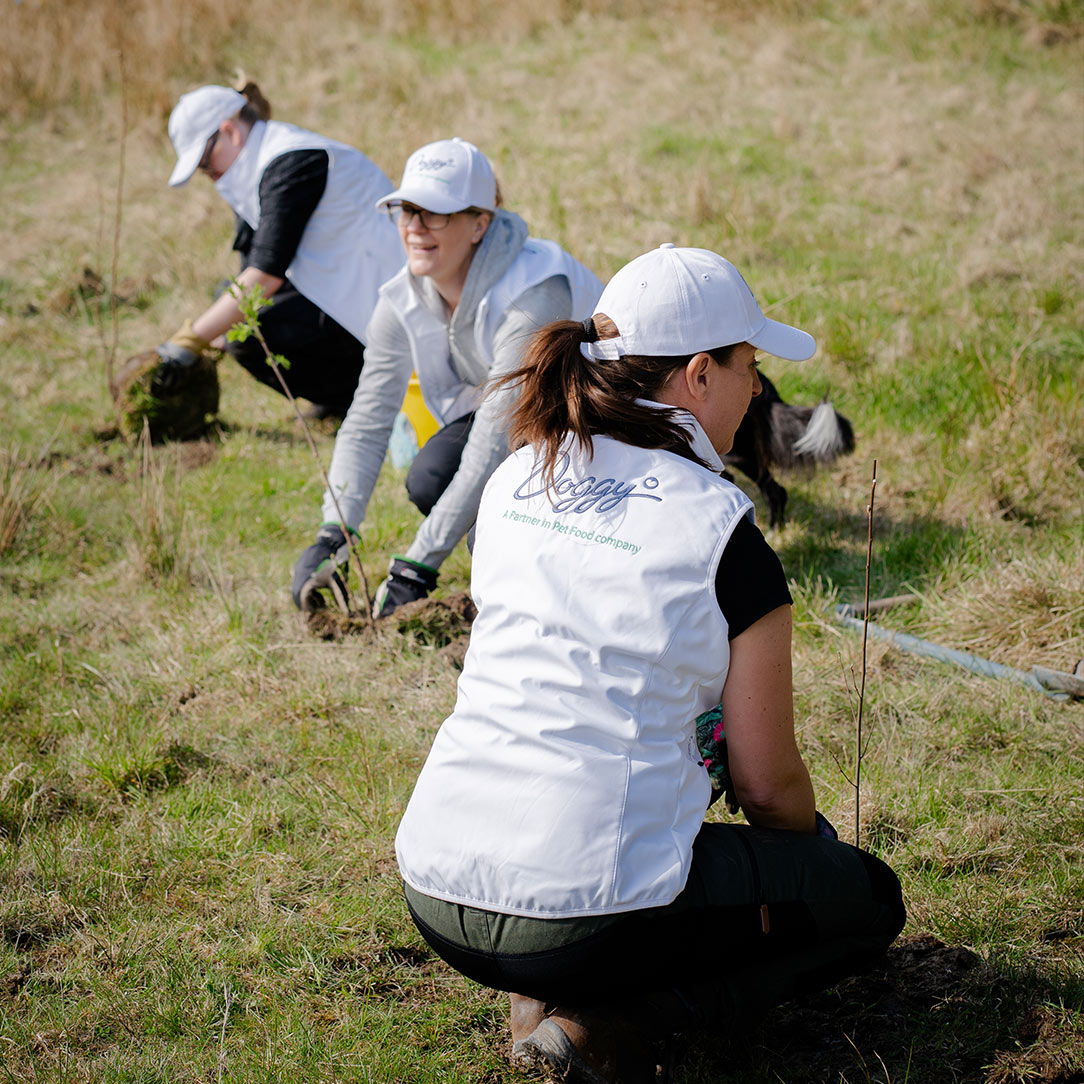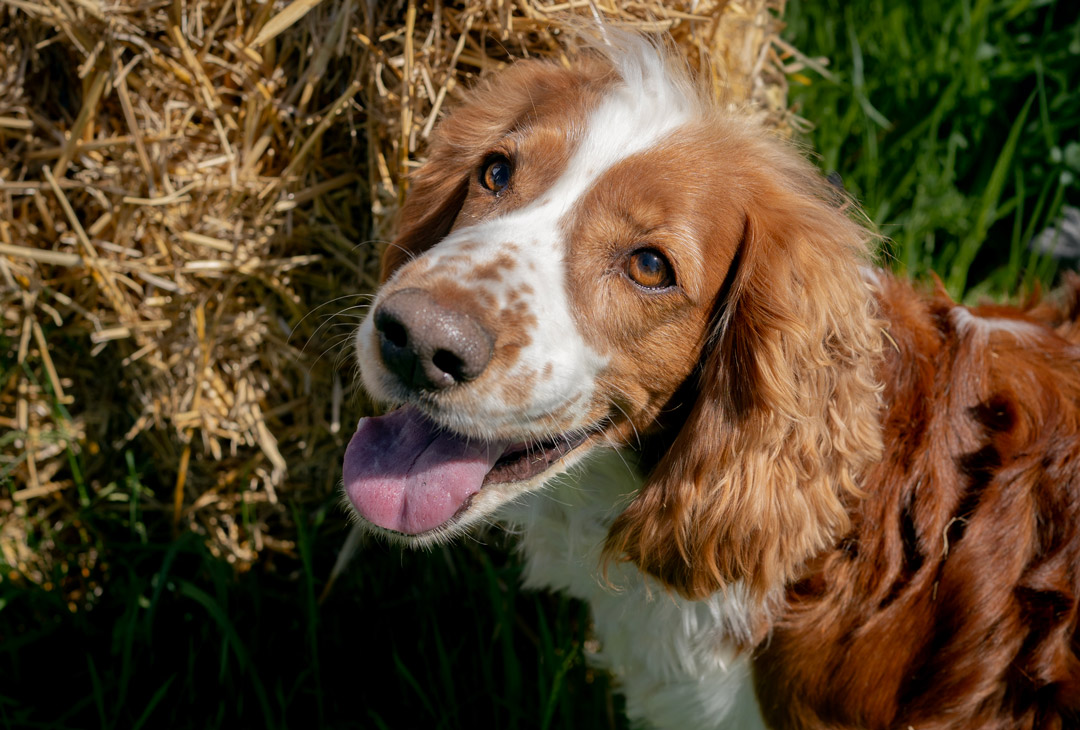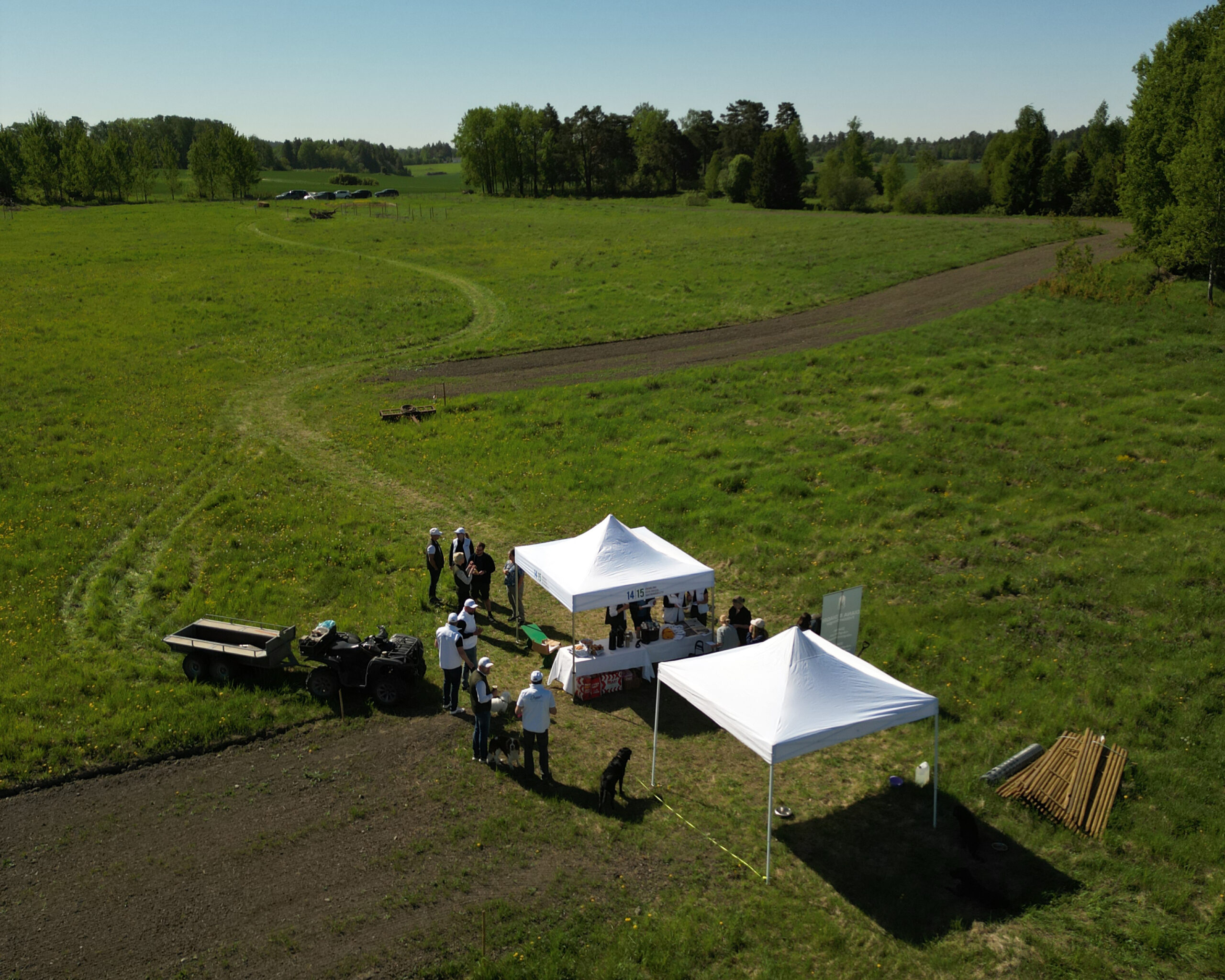Partner in Pet Food Nordics AB is Sweden’s biggest manufacture of dog and cat food – and when you are very big, you must also be very kind. To protect the environment and actively take responsibility for our environmental impact, we have invested in several concrete activities connected to the climate and biodiversity.

Made in Sweden – an environmental project on our home turf
Bozita’s kitchen is located in Vårgårda, Sweden, and is run with thought and care for nature. For us, it is a matter of course for all project initiatives to be carried out at home in Sweden.
Proximity to the projects also allows us and our employees to get involved with the work on a practical level, and to follow how the initiatives have a directly positive impact on our local environment.
We are preserving forests and planting trees – for the environment and future forest walks!
As part of the project, we are getting involved with the Swedish forest. We are planting 6 000 trees on Swedish soil, while ensuring that domestic forests are preserved and managed sustainably. The initiative has sequestered a total of ca 600 tonnes of CO2e.
Why are we doing this?
At Bozita, we love the Swedish forest. The forest is not just an incredible place for you and your dog and cat, but also an important greenhouse gas sink. Trees absorb carbon dioxide as they grow. And the more they grow, the more carbon dioxide they absorb. Planting more trees and preserving forests can therefore help combat climate change through absorption of carbon dioxide. The Swedish forest is also home to a wide variety of plants and animals, and planting trees can increase biodiversity and help create new habitats for threatened species.

Did you know…?
- Trees absorb carbon dioxide as they grow. Just how much depends on the type of tree and where in the country it is growing. One rule of thumb is that a full-grown, 80-year-old fir tree has stored 1.6 tonnes of carbon dioxide. An average Christmas tree has absorbed about 10 kg of carbon dioxide.
- A variety of trees benefits the forest. For example, mixed forests containing deciduous and coniferous trees are more resistant to insect attacks and extreme weather, such as storms and forest fires. They are also more pleasant for pet owners to visit with our dogs and cats.
- The more biodiversity, the better for the brain! A walk in the woods in an area with a wide variety of different plant and animal species offers mental stimulation for you and for your dog or cat.
We are creating an oasis for bees and wild pollinators
Respect for animals is an important part of Bozita’s compass. That applies to all animals, even the very smallest ones. We are now carrying out several concrete initiatives to preserve biodiversity. The focus is on creating a beneficial environment for bees and other pollinating insects. At the project site in Bålsta, we will plant selected species of trees and shrubs, sow seed blends that produce pollen and nectar, and put out bales of straw and sand beds where bees and other insects can build nests.
The measures are based on recommendations from the Swedish Environmental Protection Agency, Swedish Board of Agriculture and the County Administrative Boards of Sweden, and the results are being followed up over a ten-year period.
For biodiversity, we are:
- Planting selected varieties of trees and shrubs, such as oak, willow, rowan, white oak and hawthorn, guelder rose and blackberry – species that offer high biodiversity values.
- Sowing wild meadows to produce pollen and nectar. Attracting many different kinds of pollinators requires a wide variety of flowers, preferably of different varieties so that something is in bloom throughout the season. We use Malmgård Viltfrö’s bee field mix with species that bloom from June to September.
- Putting out two bales of straw, where bees and other insects can build nests.
- Setting up two 10-tonne sand beds, where bees and other insects can build nests.
- Making two fauna depots with a blend of tree stumps, branches and twigs – dead wood that is essential for food and habitats for many plants, fungi, and animals.
- Exposing rock to create warm surfaces for bees to enjoy.
- Establishing a traditional hay meadow.
- Establishing a mini wetland.
- Creating a beetle bank.
Why are we doing this?
Bees and other wild pollinators contribute to functioning ecosystems and our food supply. Upwards of 75% of all crops depend fully or in part on pollination from insects. But the situation for wild pollinators is dire, and here in Sweden, one third of our bee species are threatened. Therefore, as Sweden’s biggest pet food producer, we cannot only focus on lowering our admissions and reducing our climate footprint – we must also take responsibility for promoting wild pollinators and preserving biodiversity.
Bzz, bzz, bzz
A project with multiple positive impacts

Carbon sequestration
Trees absorb carbon dioxide as they grow, which reduces total carbon in the atmosphere and global warming.
Biodiversity
The measures will help to preserve and enhance the habitats for bees and other wild pollinators, which benefits biodiversity.
Health and well-being
Nature has a positive impact on health and well-being for animals as well as for us.
Local impact
By focusing on domestic initiatives, we are taking part in the preservation and care of nature in Sweden. Proximity to the projects also offers us even better insight and transparency with regard to the work, making it easier for us to ensure a direct and measurable effect on our local environment.
Community and involvement
As part of the project, we carry out several events, such as training our employees on the subject and giving staff the opportunity to get involved in a meaningful activity that contributes to a sense of community and belonging.

Carbon sequestration
Trees absorb carbon dioxide as they grow, which reduces total carbon in the atmosphere and global warming.
Biodiversity
The measures will help to preserve and enhance the habitats for bees and other wild pollinators, which benefits biodiversity.
Health and well-being
Nature has a positive impact on health and well-being for animals as well as for us.
Local impact
By focusing on domestic initiatives, we are taking part in the preservation and care of nature in Sweden. Proximity to the projects also offers us even better insight and transparency with regard to the work, making it easier for us to ensure a direct and measurable effect on our local environment.
Community and involvement
As part of the project, we carry out several events, such as training our employees on the subject and giving staff the opportunity to get involved in a meaningful activity that contributes to a sense of community and belonging.

Did you know…?
- Wild pollinators are important to food production. Upwards of 75% of all crops depend fully or in part on pollination from insects.
- Many little superheroes offer a helping hand. Among Sweden’s pollinating insects, bees and bumblebees do most of the heavy lifting, but butterflies, flower flies and some beetles also help out.
- Sweden is home to about 270 bee species. Some are fairly picky and many have favourite flowers. For example, different varieties might have different tongue and proboscis lengths, which means some find it easier to visit deep and funnel-shaped flowers, while others prefer shallow, wide flowers.
Let Bozita lead the way
We have invested in several concrete sustainability projects and we are now investing in training our staff. But everyone can help out! That is why we are now urging companies and individuals to join us in the movement. The more people on board, the greater the difference we can make.
Dog or cat owners – here’s what you can do
No one can do everything, but everyone can do something. Here are a few tips for how you can contribute:
- Learn about the issue – when you understand how biodiversity impacts us and our furry friends, you will be more motivated to take action.
- Outdoor cats are skilled hunters and can harm or kill rodents, birds and lizards, which has a negative impact on biodiversity. As a cat owner, you can do your best to prevent this by putting a bell on your cat’s collar, or not letting your cat go outside at night.
- Picking up after your dog is important for the environment! Dog waste in nature can lead to overfertilisation, resulting in an imbalance in the system that can reduce biodiversity in the long run.
- Transform a bit of lawn at home by planting clover or a wild meadow. (Make sure to buy a seed blend suitable for your region so that you do not spread invasive species, which can worsen the problem.)
- Support politicians and suggested policies that promote biodiversity.
- Support nature and environmental organisations that work with the issue, such as the Swedish Society for Nature Conservation, WWF or Naturarvet.

About the project
At Partner in Pet Food Nordics AB, of which Bozita is a part, we want to take responsibility for our environmental impact and are currently carrying out an ambitious project with a focus on carbon sequestration and biodiversity. The project is being carried out together with the Swedish company Initiativ 1415 and is a concrete and local example of how we are actively working to increase carbon sequestration in the Swedish forest, promote biodiversity, and preserve and strengthen habitats for wild pollinators in Swedish farmland.
Do you want to know more?
Read more about the project and how it connects to our group-wide sustainability initiatives at doggyab.com.




